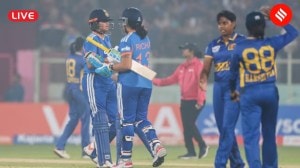Stay updated with the latest - Click here to follow us on Instagram
Dream Run
There are plays written that come and inhabit the limelight momentarily. Some stay a bit longer. But a few come back to consistently enamour...
Satish Alekars 30-year-old play,Begum Barve,returns to Mumbai with its original cast
There are plays written that come and inhabit the limelight momentarily. Some stay a bit longer. But a few come back to consistently enamour,puzzle and delight audiences by their sheer mastery and insight. Satish Alekars Begum Barve is one such play. And 30 years after it was first staged,the play is returning to a Mumbai stage with the original cast.
Located in mundane,middle-class environs in Pune,the play revolves around Barve (Chandrakant Kale)a female impersonator with an unfulfilled wish to perform her dream role. Barve worships Balgandharva,a yesteryear icon of a fading tradition of sangeet-natak. She lives under the staircase of a building with a drunk,short-tempered and at times menacing Shyamrao (Mohan Agashe). Living
above them are two clerks Bavdekar (Satish Alekar) and Javdekar (Ramesh Madhekar),who lead their secure,middle-class lives,and fantasise about marriage. In one such fantasy,a delusional Javdekar mistakes Barve for a woman and proposes marriage to her. Thus manifests a situation where Barve will finally deliver her dream performancecombining popular songs from a bygone era of sangeet-natak.
When the play premiered in 1979,audiences expected a nostalgic tribute to a dying art. What they saw instead confused them. The romanticism of the songs juxtaposed with the grim,mercurial interplay created an irony that was
beyond the grasp of viewers. The play,when it was first staged,didnt receive a good response. We had about 20-25 shows. But then this play was never popular, says Alekar,who has braved popular audience rejection before.
Alekar,along with Jabber Patel,Agashe,Mohan Gokhale,Kale and many others formed the Theatre Academy in Pune in 1974 as a breakaway from Progressive Dramatic Association (PDA) the leading experimental theatre group of the timein protest of objections raised against Vijay Tendulkars Ghashiram Kotwal,on the grounds of being anti-Brahmin. Alekar is a difficult playwright. His plays use prosaic and minimalist sets. The almost anti-theatre form he
employs put off most theatre-going audiences. Begum Barveexposed the sickening feudalism and oppressive structure within the sangeet-natak tradition and the provincial,middle-class life which audiences werent prepared for, explains playwright Ramu Ramanathan,who holds Alekars Begum Barve and Mahanirvanin high regard.
What is surprising though is that the playwhich has been revived every now and then,and now comes to Mumbai after eight yearshas suddenly gained acceptance among larger audiences. When the play was revived in September last year on request by Rangashankara,Bangalore,it received a packed audience for the three days it was staged. This could be partly because of the aura that has formed around the play over the years,and maybe the younger audiences dont look for the same kind of unity in narrative. The seamless transitions between dreams and reality,was unprecedented in Marathi theatre, remarks Shanta Gokhale,theatre critic and translator of the play to English. It was the toughest play Ive ever translated simply because of its strong cultural rootedness, she confesses.







